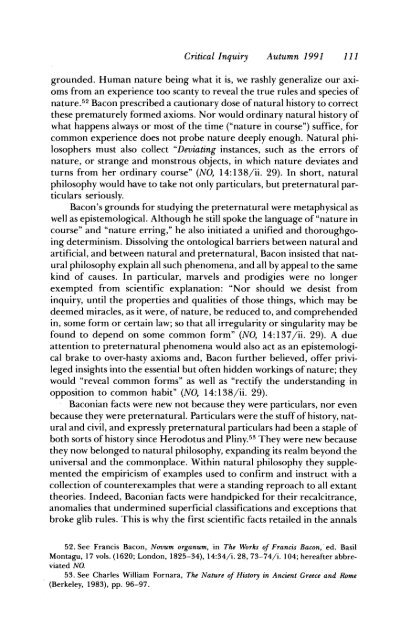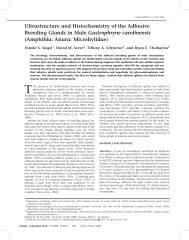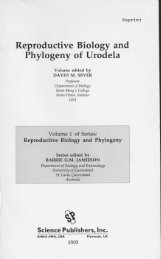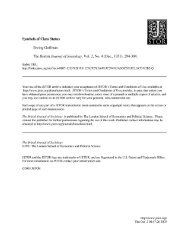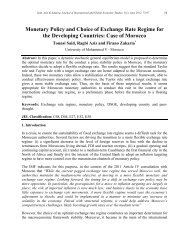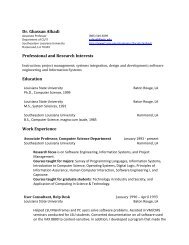Marvelous Facts and Miraculous Evidence in Early Modern Europe ...
Marvelous Facts and Miraculous Evidence in Early Modern Europe ...
Marvelous Facts and Miraculous Evidence in Early Modern Europe ...
Create successful ePaper yourself
Turn your PDF publications into a flip-book with our unique Google optimized e-Paper software.
Critical Inquiry<br />
Autumn 1991<br />
grounded. Human nature be<strong>in</strong>g what it is, we rashly generalize our axi-<br />
oms from an experience too scanty to reveal the true rules <strong>and</strong> species of<br />
nature.52 Bacon prescribed a cautionary dose of natural history to correct<br />
these prematurely formed axioms. Nor would ord<strong>in</strong>ary natural history of<br />
what happens always or most of the time ("nature <strong>in</strong> course") suffice, for<br />
common experience does not probe nature deeply enough. Natural phi-<br />
losophers must also collect "Deviat<strong>in</strong>g <strong>in</strong>stances, such as the errors of<br />
nature, or strange <strong>and</strong> monstrous objects, <strong>in</strong> which nature deviates <strong>and</strong><br />
turns from her ord<strong>in</strong>ary course" (NO, 14:138/ii. 29). In short, natural<br />
philosophy would have to take not only particulars, but preternatural particulars<br />
seriously.<br />
Bacon's grounds for study<strong>in</strong>g the preternatural were metaphysical as<br />
well as epistemological. Although he still spoke the language of "nature <strong>in</strong><br />
course" <strong>and</strong> "nature err<strong>in</strong>g," he also <strong>in</strong>itiated a unified <strong>and</strong> thoroughgo-<br />
<strong>in</strong>g determ<strong>in</strong>ism. Dissolv<strong>in</strong>g the ontological<br />
111<br />
barriers between natural <strong>and</strong><br />
artificial, <strong>and</strong> between natural <strong>and</strong> preternatural, Bacon <strong>in</strong>sisted that nat-<br />
ural philosophy expla<strong>in</strong> all such phenomena, <strong>and</strong> all by appeal to the same<br />
k<strong>in</strong>d of causes. In particular, marvels <strong>and</strong> prodigies were no longer<br />
exempted from scientific explanation: "Nor should we desist from<br />
<strong>in</strong>quiry, until the properties <strong>and</strong> qualities of those th<strong>in</strong>gs, which may be<br />
deemed miracles, as it were, of nature, be reduced to, <strong>and</strong> comprehended<br />
<strong>in</strong>, some form or certa<strong>in</strong> law; so that all irregularity or s<strong>in</strong>gularity may be<br />
found to depend on some common form" (NO, 14:137/ii. 29). A due<br />
attention to preternatural phenomena would also act as an epistemologi-<br />
cal brake to over-hasty axioms <strong>and</strong>, Bacon further believed, offer privi-<br />
leged <strong>in</strong>sights <strong>in</strong>to the essential but often hidden work<strong>in</strong>gs of nature; they<br />
would "reveal common forms" as well as "rectify the underst<strong>and</strong><strong>in</strong>g <strong>in</strong><br />
opposition to common habit" (NO, 14:138/ii. 29).<br />
Baconian facts were new not because they were particulars, nor even<br />
because they were preternatural. Particulars were the stuff of history, nat-<br />
ural <strong>and</strong> civil, <strong>and</strong> expressly preternatural particulars had been a staple of<br />
both sorts of history s<strong>in</strong>ce Herodotus <strong>and</strong> Pl<strong>in</strong>y.53 They were new because<br />
they now belonged to natural philosophy, exp<strong>and</strong><strong>in</strong>g its realm beyond the<br />
universal <strong>and</strong> the commonplace. With<strong>in</strong> natural philosophy they supple-<br />
mented the empiricism of examples used to confirm <strong>and</strong> <strong>in</strong>struct with a<br />
collection of counterexamples that were a st<strong>and</strong><strong>in</strong>g reproach to all extant<br />
theories. Indeed, Baconian facts were h<strong>and</strong>picked for their recalcitrance,<br />
anomalies that underm<strong>in</strong>ed superficial classifications <strong>and</strong> exceptions that<br />
broke glib rules. This is why the first scientific facts retailed <strong>in</strong> the annals<br />
52. See Francis Bacon, Novum organum, <strong>in</strong> The Works of Francis Bacon, ed. Basil<br />
Montagu, 17 vols. (1620; London, 1825-34), 14:34/i. 28, 73-74/i. 104; hereafter abbre-<br />
viated NO.<br />
53. See Charles William Fornara, The Nature of History <strong>in</strong> Ancient Greece <strong>and</strong> Rome<br />
(Berkeley, 1983), pp. 96-97.


